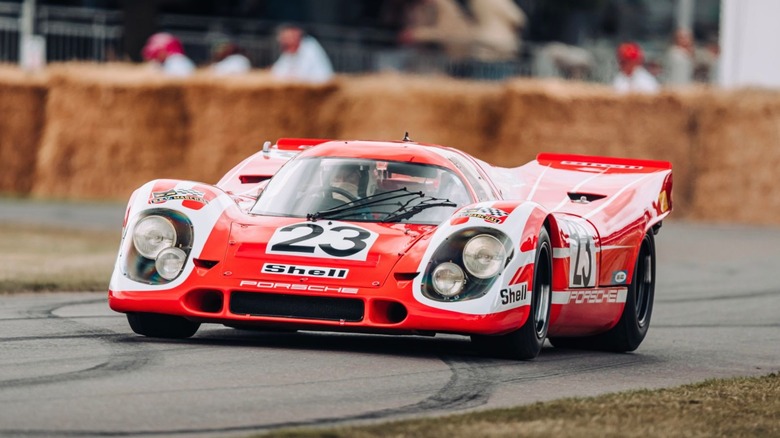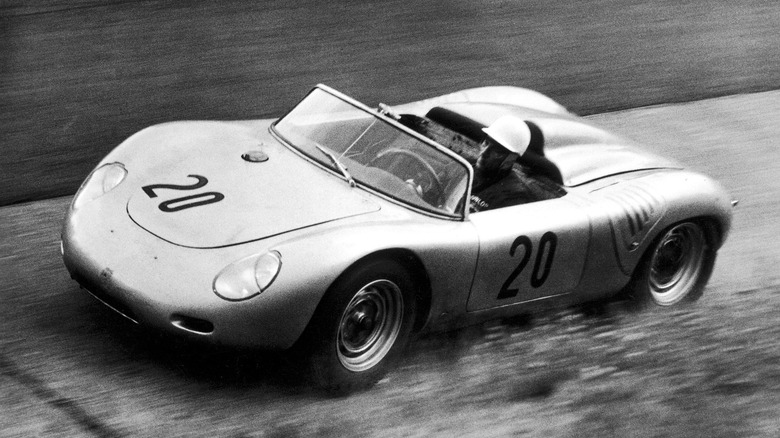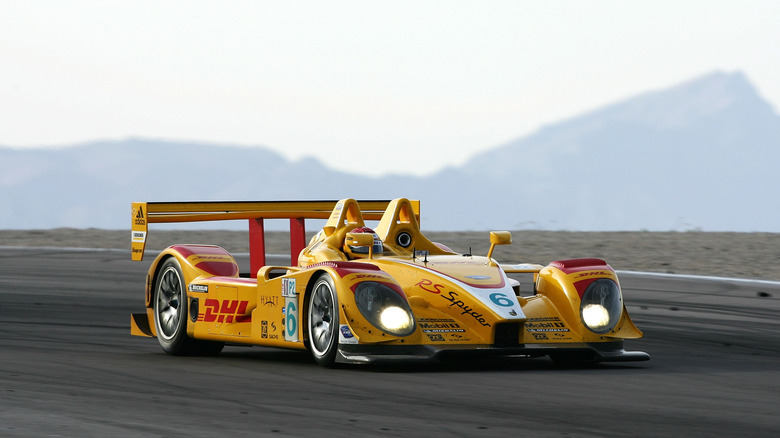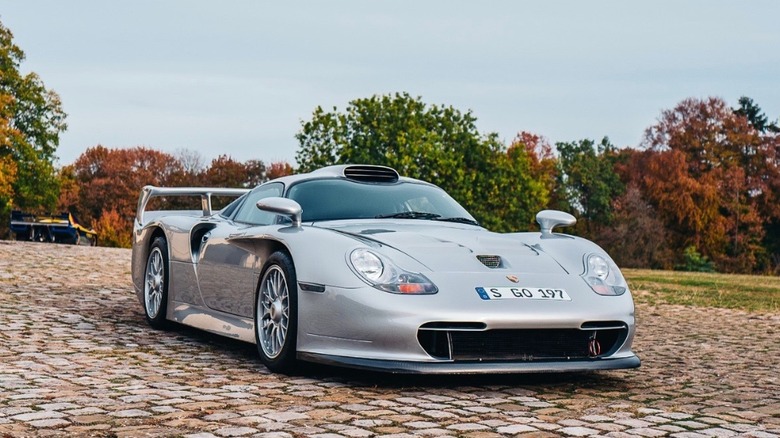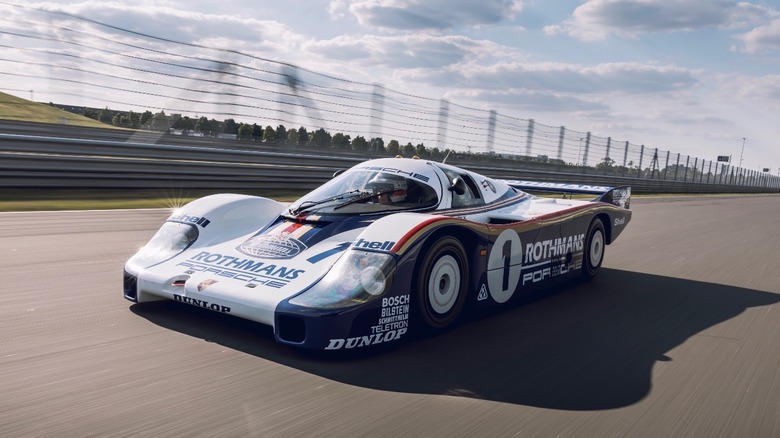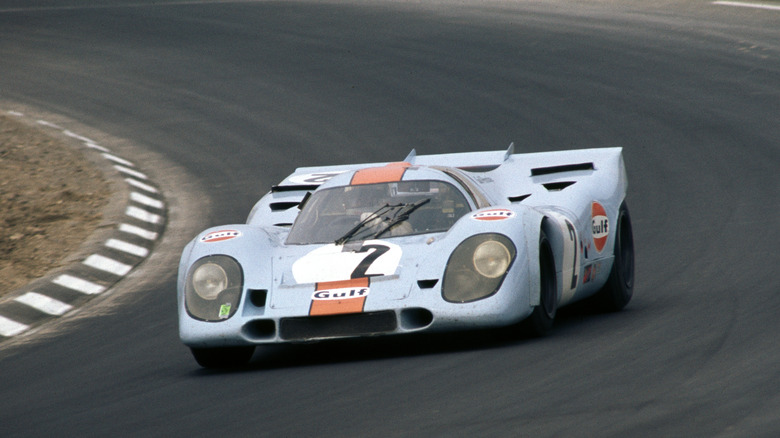5 Of The Most Expensive Porsches Ever Sold At Auction And Why They Are So Valuable
For a lot of enthusiasts, Porsche is the end-all-be-all automobile manufacturer. The fuss is entirely warranted, and much of it has to do with the brand's history of making history. Not only has Porsche created some of the most critically acclaimed road cars, with the ever-evolving Porsche 911 and Carrera GT being prime examples, but it's also one of the winningest manufacturers in motorsport. Outside of the numerous awards that road-going models have won, Porsche race cars have also won Le Mans 19 times, the Paris-Dakar rally twice, and the 24 Hours of Daytona 19 times, just to name a few.
Porsche is a manufacturer with a dynasty perhaps second only to Ferrari. While some of the company's most exclusive and legendary road cars have fetched ludicrous sums, their race cars are the ones that go for private island money. These are some of the most expensive Porsches ever sold at auction.
1960 Porsche 718 RS 60 Werks: $5,120,000
The Porsche 550 Spyder debuted at the Nürburgring in 1953 as Porsche's first purpose-built race car. It won that race and continued on to win nearly 100 more races after that. The "Giant Killer," as the 550 Spyder was later nicknamed, was a beyond-sufficient starting point for Porsche's racing program, which continued to expand on the competition Spyder platform into the early 1960s.
Porsche unveiled the final iteration of its flat-four Carrera-powered racing Spyder in 1960 to compete in that year's World Supercar Championship. That car was dubbed the 718 RS 60 and featured a number of important upgrades over the prior 718 RSK, including a wider cockpit and independent rear wishbone suspension. In total, Porsche built 18 RS 60s, with 14 of them going to privateer racing teams and the other four remaining with Porsche. In 2019, chassis number 718-044, one of the four "works" cars, went to auction in Monterey.
Not only did this particular model have a storied history competing in prestigious races from Le Mans to the Nürburgring, but it has also had some of the most important names in motorsports history behind the wheel. Le Mans winner Dan Gurney, triple crown holder Graham Hill, and legendary Formula 1 driver Stirling Moss all piloted chassis 718-044 at different points. The car's $5,120,000 valuation was undoubtedly tied to its historical significance.
2007 Porsche RS Spyder EVO: $5,615,000
Le Mans changed a lot after in the years after the Porsche 718 RS 60 first raced it. Prior to 1992, Group C was one of the largest motorsport categories in the world. The rules through the '80s allowed for a lot of experimentation within the division, leading to a golden era for racers, manufacturers, and fans. A rule change in the 1990s essentially killed Group C due to prohibitive engine requirements that forced most manufacturers to leave the World Sportscar Championship and search for other options. The American Le Mans Series was a popular alternative for many teams.
The ALMS was created in 1999 and allowed prototype race cars of multiple classes to compete, garnering the support of several large manufacturers. Porsche joined in partnership with Penske Racing in 2005, creating a car to compete in the LMP2 class. The team found immense success, winning the overall LMP2 team championship in 2006. In 2007, Porsche revised the already dominant Porsche RS Spyder to make it even more powerful and aerodynamic. The results were predictable, with DHL Porsche Penske Racing decisively clinching yet another LMP2 team championship that year. The car even placed third among LMP1 entries at the 12 Hours of Sebring in 2008.
Chassis 9R6.702 was one of the few Porsche RS Spyder EVOs ever built. It saw its own fair share of success with two outright wins and four class wins while piloted by the likes of Sascha Maassen, Ryan Briscoe, Emmanuel Collard, and Hélio Castroneves. As a result, it was an instrumental tool in Penske Racing's 2007 and 2008 ALMS championship seasons, warranting its $5,615,000 price tag when it sold at auction in 2022.
1998 Porsche 911 GT1 Straßenversion: $5,665,000
The Group GT1 class of the BPR Global GT Series gave the world some of the most intense homologation special cars in history. In the mid-1990s, the McLaren F1 GTR was the dominant force, and Porsche needed a new car to beat it.
Prior to the Porsche 911 GT1, most homologation cars were road cars that were then turned into race cars, but Porsche decided to do it the other way around with the GT1. The company designed a purpose-built Le Mans GT car by chopping a 993 in half and connecting its front to the rear of a 962 prototype race car. The result took advantage of a revised version of the 962's 3.2L twin-turbo flat-six and retained the 962's mid-engine layout, separating it from the 911's historically rear-engine format. In order for this Frankenstein to compete in the series, Porsche was required to build examples for the road — the GT1 Straßenversion.
While the race version of the 911 GT1 was off winning Le Mans in 1998, Porsche was modifying the road version in Stuttgart, of which only 20 were built. One of these GT1 Straßenversions went up for auction in 2017 and unsurprisingly went for $5,665,000 due to its rarity and pedigree.
1982 Porsche 956: $10,120,000
The state of the World Sportscar Championship was in flux at the beginning of the 1980s, with FISA introducing a new prototype class in 1982. That class, Group C, gave birth to one of the most legendary and cutthroat eras in racing history. The freedom of Group C, with very few rules outside of fuel and size restrictions, led to some of the fastest cars ever raced at Le Mans.
With the introduction of Group C and the new regulations that came with it, Porsche wanted to introduce something groundbreaking. The company's previous 963 prototype carried it to the top of the podium at Le Mans three times in 1976, 1977, and 1981, cementing Porsche as the team to beat as the new class was added. Instead of advancing the 963 chassis, which was, in essence, a 1960s design, legendary Porsche designer Norbert Singer crafted an all-new car for 1982. The 956, as it was eventually known, went on an incredible run over the next few years, winning numerous FIA World Sportscar Championship titles and Le Mans while breaking records along the way. Its winning streak secured its spot as the most legendary car in Group C racing.
In 2015, chassis 956-003 went to auction at Pebble Beach as one of the crown jewels of the event. This particular model is one of the most sought-after 956 examples, as it was the outright winner of the 1983 24 Hours of Le Mans. The car ultimately sold for a staggering $10,120,000.
1970 Porsche 917K: $14,080,000
The 917 is unquestionably Porsche's most iconic race car and arguably the most iconic race car of all time. However, it wasn't the immediate success that many other Porsche race cars before and after it were. In fact, many drivers actively avoided driving it when it debuted in 1969 due to its quick development and dangerous reputation.
With the World Sportscar Championship engine displacement limit expanded to 5 liters in 1968, plans for the 917 began. Porsche designed, engineered, and built the 25 required 917s in just 10 months based on the previously successful 907 and 908 race cars. Two versions were made — the 917K, or "short," variant and the 917LH, or "long tail." The 917 initially struggled with handling issues in its rookie season, but it went on an unprecedented tear the following year in 1970. The car won 9 out of 10 races in the 1970 World Sportscar Championship and took the overall Le Mans victory. It continued its dominance for another five years, both in Europe and internationally.
Unlike most of the other cars on this list, the 1970 Porsche 917K chassis number 917-024 isn't a valuable car because of its individual racing feats, having never raced outside of testing days. Even still, the legacy it represents was enough to earn it an enormous $14,080,000 price tag when it sold at auction in 2017.
